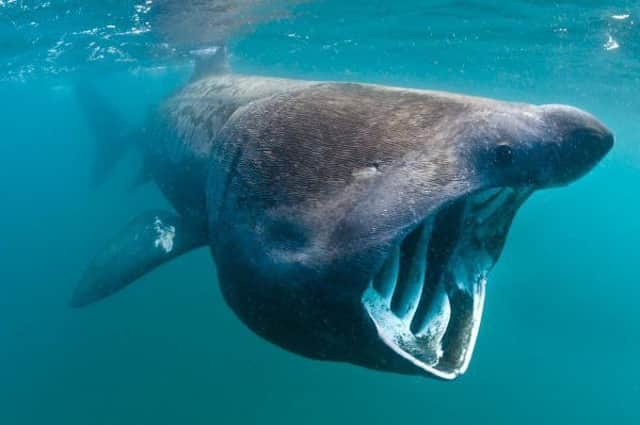Pioneering research sheds light on why basking sharks visit Scottish waters


Researchers from Scottish Natural Heritage (SNH) and the University of Exeter (UoE) have been fitting special tags to the ocean giants to gather footage that will reveal what they do while swimming in Scottish waters.
Basking sharks are the second-largest fish in the world, reaching lengths of up to 10m.
Advertisement
Hide AdAdvertisement
Hide AdBut, despite their size and prevalence in Scotland, little is understood about the plankton-eaters’ social interactions.
Scientists are now seeking to find out whether Scottish seas are a mating ground for the species, which is protected in Scotland and the UK.
Dr Suzanne Henderson, policy and advice officer at SNH, said: “A large number of sharks appear each year just off the western coast of Scotland, in the Sea of the Hebrides.
“However, there has been limited research to show exactly what they’re doing here: do they come solely to feed on plankton, or are they courting each other and using our coast as a mating ground?”
Three sharks found near the Isle of Mull have recently been fitted with towed camera tags, which are attached at the base of the main dorsal fin. They trail slightly behind the fish and film their activities.
It is believed this type of device has never before been used on basking sharks. Recent videos have revealed sharks being sociable, with the first evidence of groups congregating on the seabed.
“The footage we’ve collected gives a fantastic shark’s-eye view of the environment and new insight into behaviours,” said Dr Matthew Witt, senior lecturer in natural environment at UoE.
“We can see sharks very closely aggregating near the seabed, potentially forming social groups. Three sharks are seen very close together, fins touching but hardly swimming. We haven’t seen basking sharks exhibit this behaviour at depth, and early in the morning, before.”
Advertisement
Hide AdAdvertisement
Hide AdIt’s also hoped that the camera tags might capture the first film of basking sharks mating.
Dr Lucy Hawkes, senior lecturer in physiological ecology at UoE, added: “As yet we don’t know how human activity might inadvertently affect their behaviour, including mating, and as such this project offers an exciting opportunity to look more deeply into the lives of these large planktivorous sharks. “It’s also possible that future footage we collect will record basking sharks mating – to our knowledge this would be the first recording.”
SNH and UoE have been collaborating on basking shark research since 2012. Previous work revealed that individuals return annually to the same areas of Scotland.